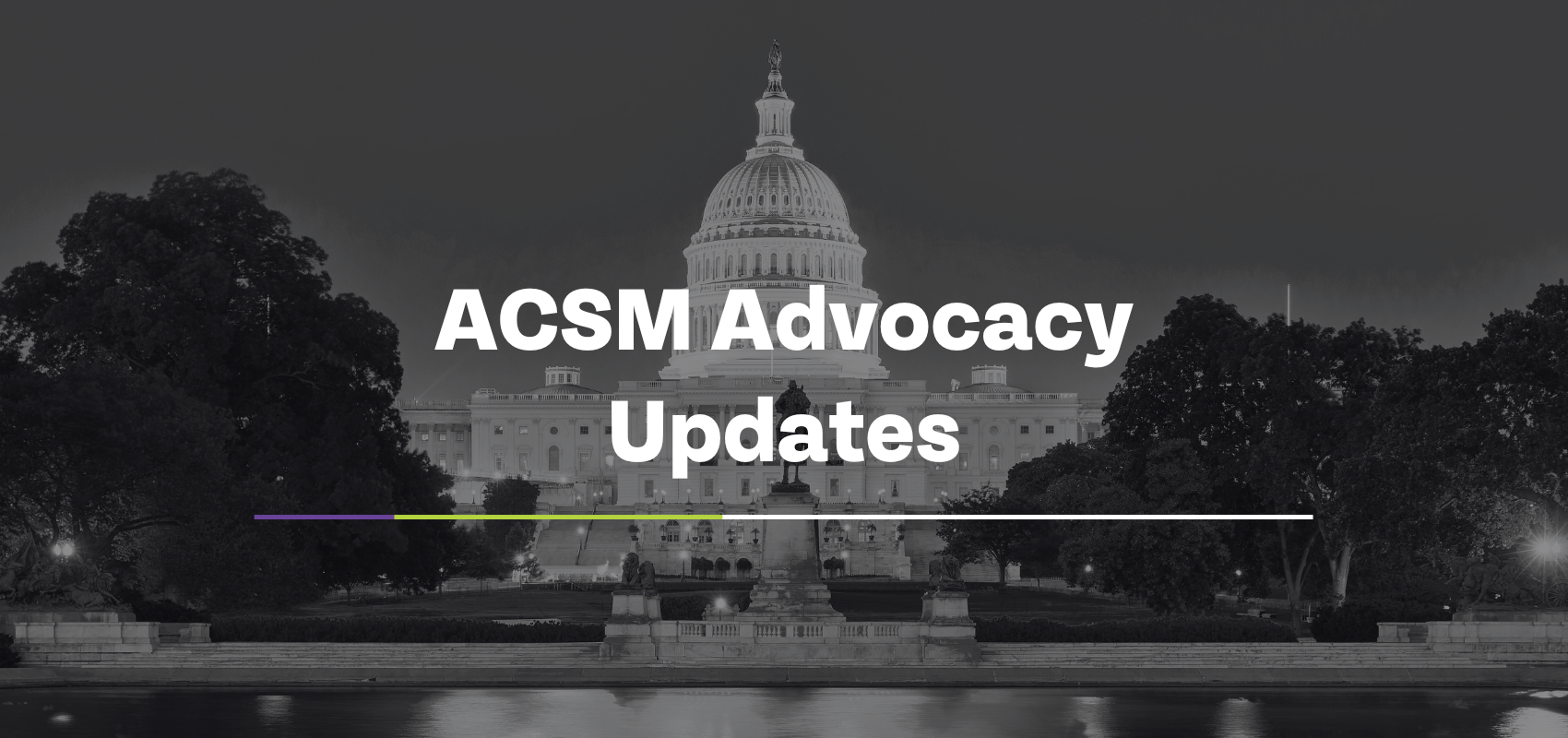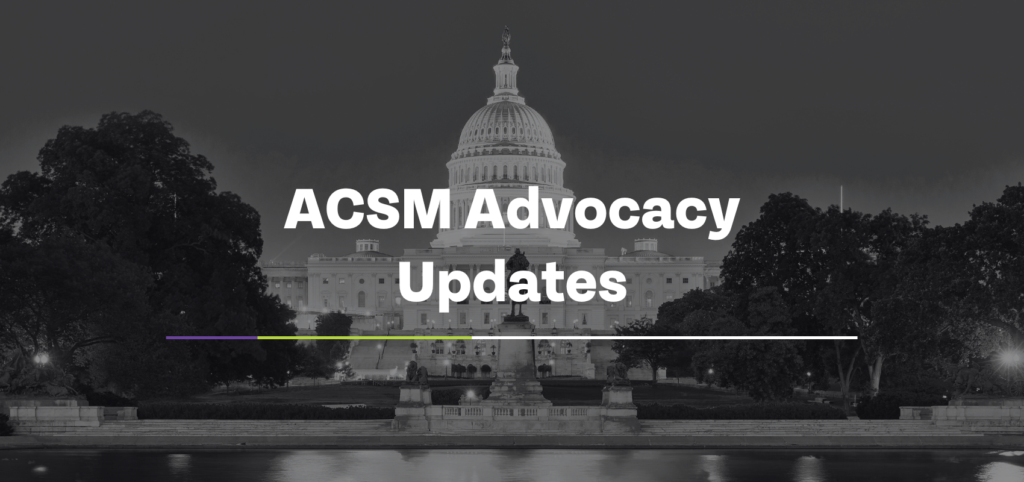ACSM continues to monitor, assess, and act on developments coming from the Trump Administration and Congress that are critical to our members and the profession. Here are the latest updates, decisions, and announcements.
Senate Committee Passes FY 2026 Labor-HHS Spending Bill
On July 31, 2025, the Senate Committee on Appropriations conducted a comprehensive, full- committee markup of its Labor, Health and Human Services, and Education (Labor-HHS) appropriations bill for FY 2026, advancing the legislation by a strong bipartisan vote of 26-3 under the leadership of Committee Chair Susan Collins (R-ME) and Vice Chair Patty Murray (D-WA). The $197 billion discretionary funding measure represents a significant investment in public health, education, and workforce development, while explicitly rejecting the Trump Administration’s proposed 40 percent cuts to numerous federal health and education programs.
The bill provides $48.7 billion for the National Institutes of Health (NIH), representing a $400 million increase from FY 2025 levels and directly countering the administration’s proposed $18 billion reduction. This funding includes targeted investments of $7.4 billion for the National Cancer Institute (with $28 million specifically for the Childhood Cancer STAR Act), $3.9 billion for Alzheimer’s disease and related dementia research, $2.3 billion for the National Institute of Diabetes and Digestive and Kidney Diseases, and a $19 million increase for rare disease research above FY 2025 levels. Additionally, the legislation allocates $30 million in increased funding for the Office of Research on Women’s Health and $20 million more for maternal health research.
The measure provides robust funding for the Centers for Disease Control and Prevention at $9.096 billion and allocates $1.383 billion for the Health Resources and Services Administration’s Bureau of Health Workforce. Mental health receives substantial attention with more than $534.6 million for the Substance Abuse and Mental Health Services Administration’s 988 suicide prevention lifeline, $385.5 million for Certified Community Behavioral Health Clinics, $2.2 billion for the National Institute of Mental Health and $180 million for school-based mental health grants.
The bill preserves traditional policy riders including Hyde and Hyde-Weldon conscience protections, needle exchange prohibition, NLRB electronic voting prohibition and the Dickey Amendment, while adding new transparency measures for federal spending. Following committee approval, the legislation now moves to the Senate floor for consideration, while the House Appropriations Committee has delayed its markup of the companion FY 2026 Labor-HHS bill until early September.
The full bill text is available here. The Labor-HHS Senate report is available here.
GAO’s Decision Regarding FY 2025 NIH Appropriations
The Government Accountability Office (GAO) on August 5, 2025 released a decision finding that NIH violated the Impoundment Control Act (ICA) by withholding FY 2025 appropriated funds. This withholding, triggered by executive orders, led to canceled grants, paused grant reviews and reduced NIH funding obligations, disrupting critical research momentum.
ACSM emphasizes that timely and transparent funding is vital to support scientific progress in exercise and health-related research. The ICA requires federal agencies to prudently obligate appropriations unless Congress legislates otherwise, ensuring consistent access to resources.
While HHS has lifted the pause on grant processes, ACSM calls for greater transparency on NIH’s current FY 2025 funding status. ACSM remains committed to advocating for full and efficient use of research funds to advance public health and innovation.
The full text of GAO’s report is available here.
Executive Order Establishes New Requirements for Reviewing and Approving Discretionary Grants
On August 7, 2025, President Trump issued an Executive Order (EO) titled Improving Oversight of Federal Grantmaking, introducing new protocols for the review and approval of discretionary grants. The order requires agencies to appoint political appointees responsible for overseeing funding opportunity announcements and discretionary awards to ensure grants align with administration priorities and serve the public interest. It mandates enhanced interagency coordination to minimize duplication and calls for plain-language application materials to streamline the funding process. The order specifies prohibitions on funding activities that promote racial discrimination, reject the sex binary, support illegal immigration, or advance anti-American values. It also prioritizes institutions with lower indirect cost rates. Additionally, the order authorizes the Office of Management and Budget to update the Uniform Guidance to simplify application requirements and permits termination of grants that no longer align with agency priorities or the national interest. Agencies are directed to revise grant terms to allow termination for convenience and require grantees to substantiate drawdowns with appropriate documentation.
The EO can be found here.
CDC Director Sworn In
On July 31, 2025, President Trump’s nominee for Centers for Disease Control and Prevention (CDC) Director, Dr. Susan Monarez, was sworn in by HHS Secretary Robert F. Kennedy, Jr. The Senate confirmed her nomination on July 29, 2025, by a vote of 51-47. The Senate HELP Committee previously approved her nomination by a vote of 12-11 on July 25, 2025. During her confirmation hearing, Dr. Monarez, a microbiologist and former deputy director at the Advanced Research Projects Agency for Health (ARPA-H), emphasized the importance of science-based public health communication and vaccination.
An HHS press release on Dr. Monarez’s confirmation can be found here.
Please contact me at mward@acsm.org with any questions, concerns or suggestions regarding how we can best advocate for you and your profession on Capitol Hill.


